

Philosophy: Logic.
Atheist Meme Base. Thou shalt not commit logical fallacies. Atheist Meme Base. List of paradoxes. This is a list of paradoxes, grouped thematically.
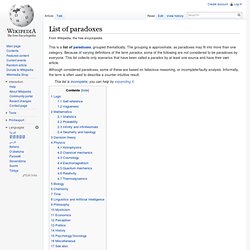
The grouping is approximate, as paradoxes may fit into more than one category. Because of varying definitions of the term paradox, some of the following are not considered to be paradoxes by everyone. This list collects only scenarios that have been called a paradox by at least one source and have their own article. Although considered paradoxes, some of these are based on fallacious reasoning, or incomplete/faulty analysis.
Informally, the term is often used to describe a counter-intuitive result. Logic[edit] Self-reference[edit] These paradoxes have in common a contradiction arising from self-reference. Barber paradox: A barber (who is a man) shaves all and only those men who do not shave themselves. Vagueness[edit] Ship of Theseus (a.k.a. Deontological ethics. Deontological ethics or deontology is the normative ethical position that judges the morality of an action based on the action's adherence to a rule or rules.[1] It is sometimes described as "duty" or "obligation" or "rule"-based ethics, because rules "bind you to your duty".[2] Deontological ethics is commonly contrasted to consequentialism[3] and virtue ethics.
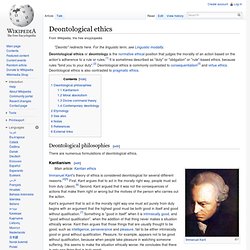
Deontological ethics is also contrasted to pragmatic ethics. Deontological philosophies[edit] There are numerous formulations of deontological ethics. Kantianism[edit] Immanuel Kant's theory of ethics is considered deontological for several different reasons.[4][5] First, Kant argues that to act in the morally right way, people must act from duty (deon).[6] Second, Kant argued that it was not the consequences of actions that make them right or wrong but the motives of the person who carries out the action.
Kant's three significant formulations of the categorical imperative are: Materialism. Materialism is a form of philosophical monism which holds that matter is the fundamental substance in nature, and that all phenomena, including mental phenomena and consciousness, are the result of material interactions.
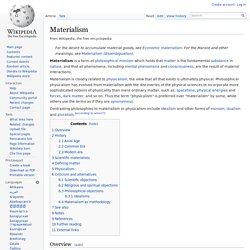
Materialism is closely related to physicalism; the view that all that exists is ultimately physical. Philosophical physicalism has evolved from materialism with the discoveries of the physical sciences to incorporate more sophisticated notions of physicality than mere ordinary matter, such as: spacetime, physical energies and forces, dark matter, and so on. Thus the term "physicalism" is preferred over "materialism" by some, while others use the terms as if they are synonymous. Overview[edit] Despite the large number of philosophical schools and subtle nuances between many,[1][2][3] all philosophies are said to fall into one of two primary categories, which are defined in contrast to each other: Idealism, and materialism.
Pragmatism. Pragmatism is a philosophical tradition that began in the United States around 1870.[1] Pragmatism is a rejection of the idea that the function of thought is to describe, represent, or mirror reality[citation needed].
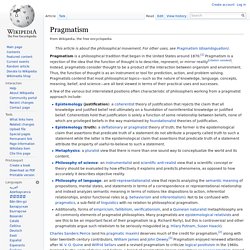
Instead, pragmatists consider thought to be a product of the interaction between organism and environment. Thus, the function of thought is as an instrument or tool for prediction, action, and problem solving. Pragmatists contend that most philosophical topics—such as the nature of knowledge, language, concepts, meaning, belief, and science—are all best viewed in terms of their practical uses and successes. A few of the various but interrelated positions often characteristic of philosophers working from a pragmatist approach include: Charles Sanders Peirce (and his pragmatic maxim) deserves much of the credit for pragmatism,[2] along with later twentieth century contributors, William James and John Dewey.[3] Pragmatism enjoyed renewed attention after W.
Philosophical movement. A philosophical movement is either the appearance or increased popularity of a specific school of philosophy, or a fairly broad but identifiable sea-change in philosophical thought on a particular subject.
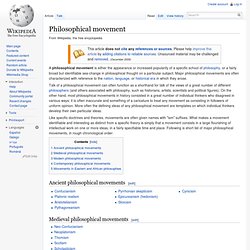
Major philosophical movements are often characterized with reference to the nation, language, or historical era in which they arose. Talk of a philosophical movement can often function as a shorthand for talk of the views of a great number of different philosophers (and others associated with philosophy, such as historians, artists, scientists and political figures). On the other hand, most philosophical movements in history consisted in a great number of individual thinkers who disagreed in various ways; it is often inaccurate and something of a caricature to treat any movement as consisting in followers of uniform opinion. More often the defining ideas of any philosophical movement are templates on which individual thinkers develop their own particular ideas. Empiricism. John Locke, a leading philosopher of British empiricism Empiricism is a theory which states that knowledge comes only or primarily from sensory experience.[1] One of several views of epistemology, the study of human knowledge, along with rationalism and skepticism, empiricism emphasizes the role of experience and evidence, especially sensory experience, in the formation of ideas, over the notion of innate ideas or traditions;[2] empiricists may argue however that traditions (or customs) arise due to relations of previous sense experiences.[3] Empiricism, often used by natural scientists, says that "knowledge is based on experience" and that "knowledge is tentative and probabilistic, subject to continued revision and falsification.
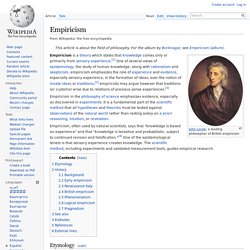
"[4] One of the epistemological tenets is that sensory experience creates knowledge. The scientific method, including experiments and validated measurement tools, guides empirical research.